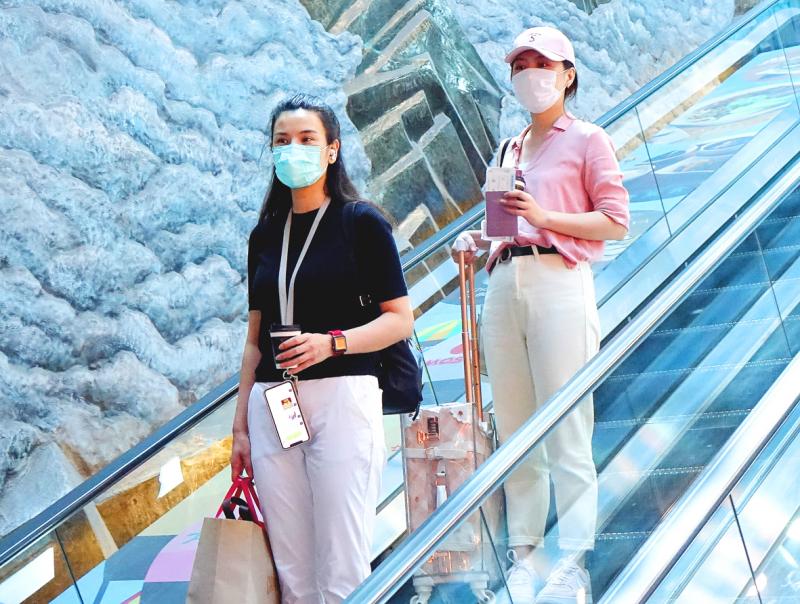Two Chinese reporters yesterday left Taiwan after the government revoked their accreditation and ordered them to leave amid a probe into allegations that several Chinese media outlets have set up studios and produced political talk shows in Taiwan.
The two reporters — Ai Kezhu (艾珂竹) and Lu Qiang (盧薔) — worked for Fujian Province-based Southeast Television and arrived in Taiwan in December last year.
The Mainland Affairs Council has launched an investigation after local media reported that Chinese broadcasters — including China Central Television, Southeast Television and FJTV — had set up studios in Taipei and produced political talk shows.

Photo: Chu Pei-hsiung, Taipei Times
Council Deputy Minister Chiu Chui-cheng (邱垂正) on Thursday said that the council had been keeping a close watch on Chinese reporters based in Taiwan, and that it maintains close contact with the Ministry of Culture to deal with Chinese journalists if they are involved in any breaches of the nation’s laws.
Taiwan in 2000 opened up to Chinese reporters based on a policy of promoting journalism exchanges across the Taiwan Strait, allowing them to cover local news.
If TV news programming had been produced in Taiwan, then the Chinese journalists must have contravened the law, Chiu said.
In such cases, the government can revoke their accreditation and work permit, and impose entry restrictions according to the Items of Note for Reporters from the Mainland Area Reporting in Taiwan (大陸地區新聞人員進入臺灣地區採訪注意事項), the Act on Permission for Entrance of People of the Mainland Area Into the Taiwan Area (大陸地區人民進入臺灣地區許可辦法) and the Act Governing Relations Between the People of the Taiwan Area and the Mainland Area (臺灣地區與大陸地區人民關係條例), he said.
However, the council did not confirm that the journalists had been expelled because of the content of the programs.
The Ministry of Culture said that it sent a formal notice to Southeast Television on Tuesday, demanding changes to its operations in Taiwan.
The ministry did not say how the TV station had responded and why the journalists were ordered to leave in the same week as the the warning was issued.
Ai yesterday said that Southeast Television had been operating in Taiwan for 12 years and every member of the media outlet had complied with Taiwanese laws.
“Our job in Taiwan is to interview people and ask questions; we don’t make TV programs in Taiwan,” Ai said.
Southeast Television journalists had not made any appearances on political talk shows or offered any personal opinions, she said.
Separately yesterday, China’s Taiwan Affairs Office spokeswoman Zhu Fonglian (朱鳳蓮) said that the Democratic Progressive Party (DPP) authorities should cease their “arbitrary oppression” of the journalistic freedom of Chinese reporters or “shoulder the consequences.”
Driving Lu and Ai out of Taiwan highlighted the DPP’s hypocrisy regarding journalistic freedom, she said.
The objective reporting of Taiwanese issues by Chinese reporters over many years had helped Chinese viewers better understand Taiwan, Zhu said, adding that the rights of Chinese reporters should be protected and respected.

‘DANGEROUS GAME’: Legislative Yuan budget cuts have already become a point of discussion for Democrats and Republicans in Washington, Elbridge Colby said Taiwan’s fall to China “would be a disaster for American interests” and Taipei must raise defense spending to deter Beijing, US President Donald Trump’s pick to lead Pentagon policy, Elbridge Colby, said on Tuesday during his US Senate confirmation hearing. The nominee for US undersecretary of defense for policy told the Armed Services Committee that Washington needs to motivate Taiwan to avoid a conflict with China and that he is “profoundly disturbed” about its perceived reluctance to raise defense spending closer to 10 percent of GDP. Colby, a China hawk who also served in the Pentagon in Trump’s first team,

SEPARATE: The MAC rebutted Beijing’s claim that Taiwan is China’s province, asserting that UN Resolution 2758 neither mentions Taiwan nor grants the PRC authority over it The “status quo” of democratic Taiwan and autocratic China not belonging to each other has long been recognized by the international community, the Mainland Affairs Council (MAC) said yesterday in its rebuttal of Beijing’s claim that Taiwan can only be represented in the UN as “Taiwan, Province of China.” Chinese Minister of Foreign Affairs Wang Yi (王毅) yesterday at a news conference of the third session at the 14th National People’s Congress said that Taiwan can only be referred to as “Taiwan, Province of China” at the UN. Taiwan is an inseparable part of Chinese territory, which is not only history but

CROSSED A LINE: While entertainers working in China have made pro-China statements before, this time it seriously affected the nation’s security and interests, a source said The Mainland Affairs Council (MAC) late on Saturday night condemned the comments of Taiwanese entertainers who reposted Chinese statements denigrating Taiwan’s sovereignty. The nation’s cross-strait affairs authority issued the statement after several Taiwanese entertainers, including Patty Hou (侯佩岑), Ouyang Nana (歐陽娜娜) and Michelle Chen (陳妍希), on Friday and Saturday shared on their respective Sina Weibo (微博) accounts a post by state broadcaster China Central Television. The post showed an image of a map of Taiwan along with the five stars of the Chinese flag, and the message: “Taiwan is never a country. It never was and never will be.” The post followed remarks

INVESTMENT WATCH: The US activity would not affect the firm’s investment in Taiwan, where 11 production lines would likely be completed this year, C.C. Wei said Investments by Taiwan Semiconductor Manufacturing Co (TSMC, 台積電) in the US should not be a cause for concern, but rather seen as the moment that the company and Taiwan stepped into the global spotlight, President William Lai (賴清德) told a news conference at the Presidential Office in Taipei yesterday alongside TSMC chairman and chief executive officer C.C. Wei (魏哲家). Wei and US President Donald Trump in Washington on Monday announced plans to invest US$100 billion in the US to build three advanced foundries, two packaging plants, and a research and development center, after Trump threatened to slap tariffs on chips made